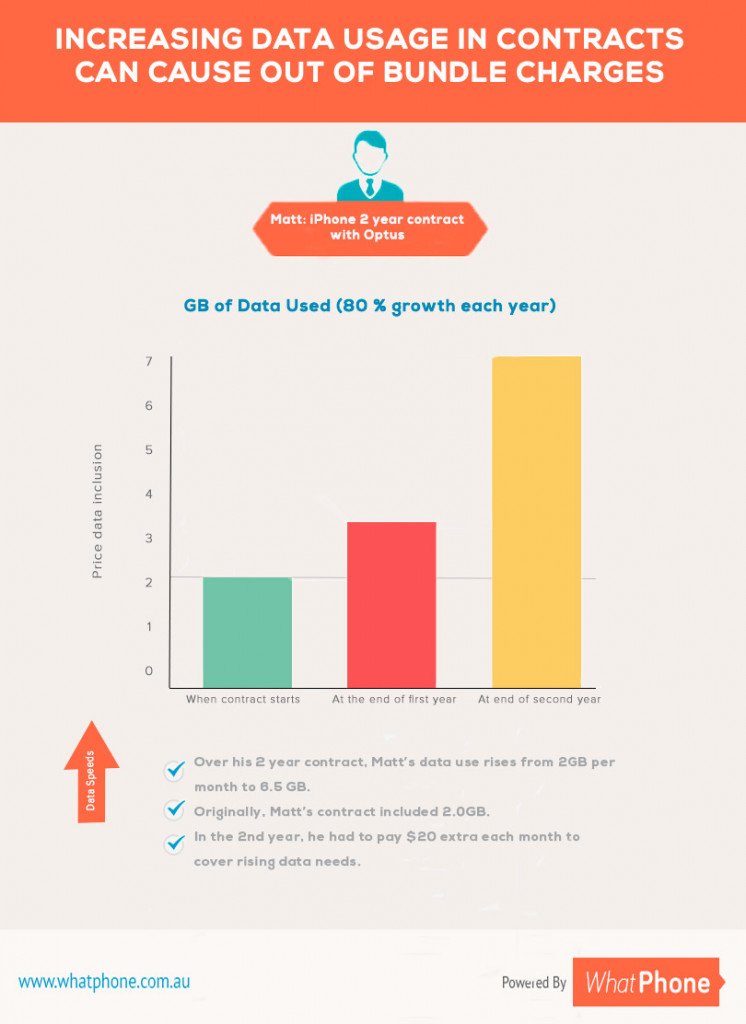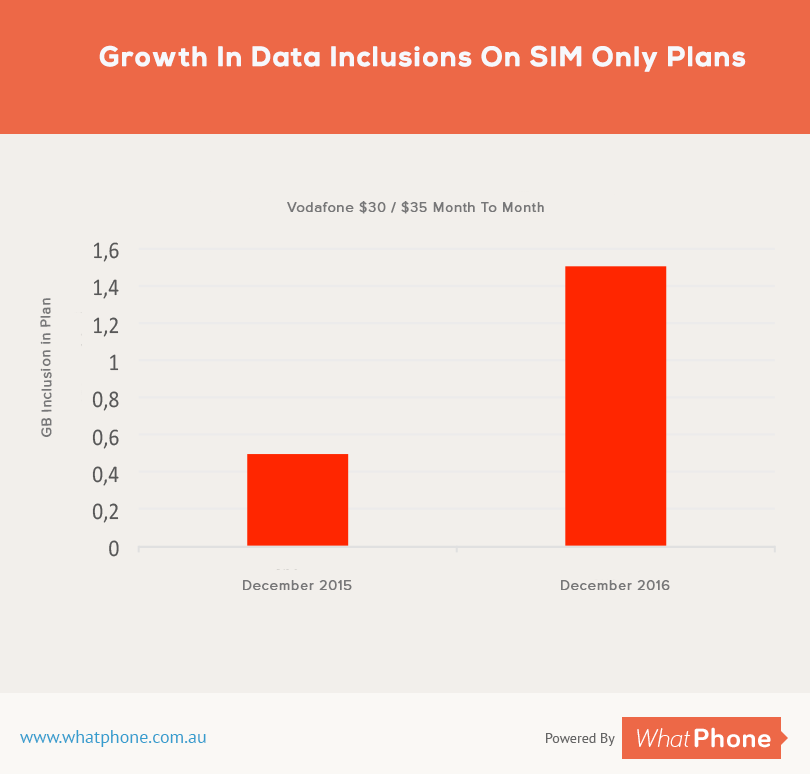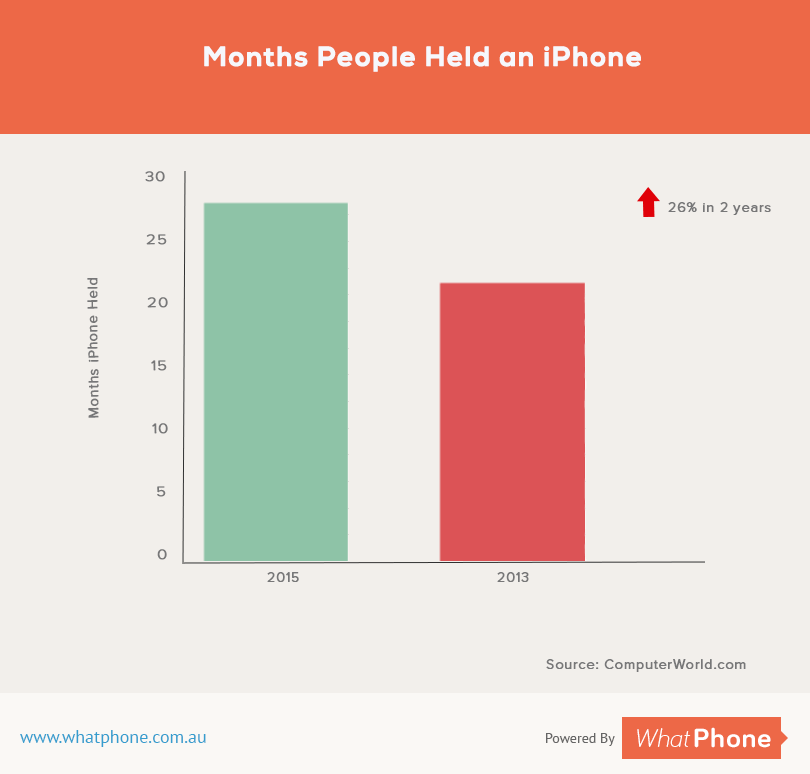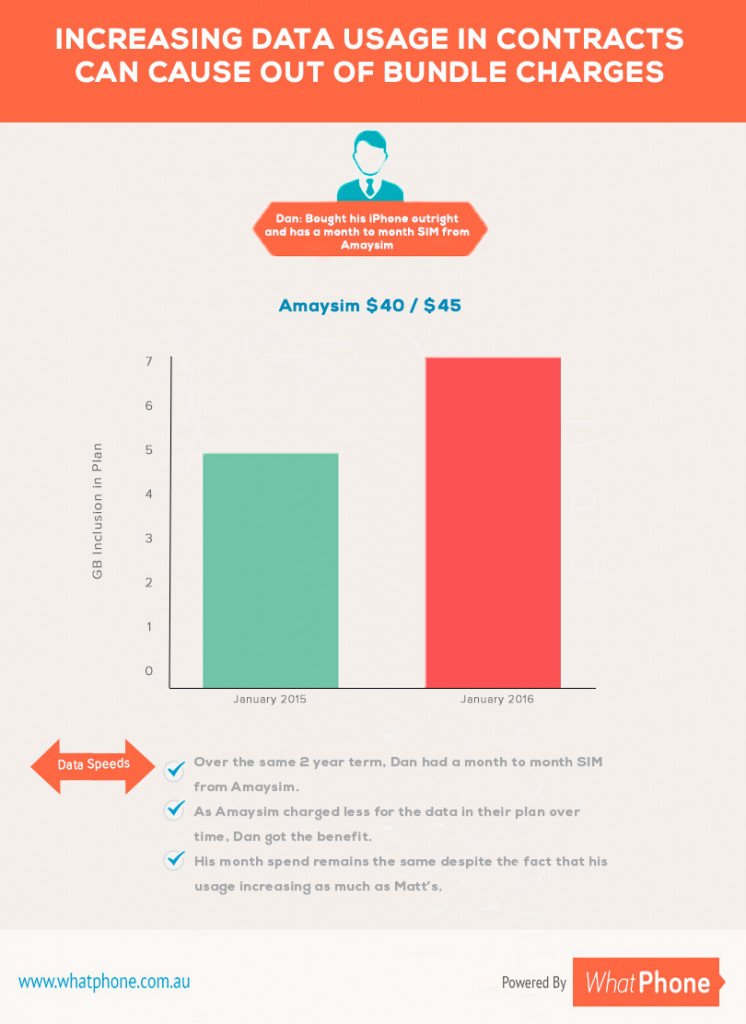Introducing the facts about mobile contracts you need to know
Mobile phone contracts can cost their owners $500 in unexpected fees and overage. Here’s the whole story in 60 seconds :
- Fact 1:
If you sign a contract with your phone company, during the agreement, your data usage will increase around 90 per cent per year. If you find these things easier to understand with a visual assist, we have an infographic and statistics (with sources) below. - Fact 2:
That extra data is often charged for at $10 per 1GB. You could end up paying $250 for the extra gigs you use, even at those rates. Example below. - Fact 3:
The phone company may not automatically move you to a SIM Only plan when your contract ends. It is down to you to keep a note of the agreement and to move to the most advantageous position possible. - Fact 4:
Finally, these days, mot people end up keeping the phone longer than you thought. If you do what others are doing (keeping your phone an extra 6 months) this too, could save you $250 vs a re-contracted option.
The details the phone companies don’t want you to piece together
I used to work in the Digital Sales team at Virgin Mobile Australia. I remember seeing the sales results come in, at the start of 2013. SIM Only sales were rocketing. It took a while for the news to sink in to Virgin. That was the start of a consumer shift that is so fundamental it is re-defining the way people buy phone plans in Australia. Together with other factors we have covered elsewhere the result is that month to month SIM Only / prepaid deals are now the majority of connections in Australia.
The telcos used to love signing their customers up to phone contracts. They knew they just had to be nice to you for a couple of weeks while you made your decision and then they could forget about you for another 2 years. The reduction in their popularity means that better service, and higher inclusions amongst other things.
If you are still looking in to the alternatives and considering your options around the phone and plan you need, There are some critical facts you need to know to avoid paying extra fees in a phone company contract.
What buying a contract – it’s a Minimum Total Cost
What many people don’t realize is that signing a contract with a phone company for a ‘fixed’ monthly fee is something of a misnomer. The fee you are agreeing to is not fixed at all. The price you agree pay each month is the minimum fee you will be charged. If you check the agreement closely, you will see exactly that wording. With any telco contract, the phone company is obliged to tell you the Minimum Total Cost you will pay.
Other costs, those incurred in addition to the Minimum Total, can add up. Below are some examples. The main culprit is data overage charging – that’s the data you pay for on top of what you bought in your agreement. There are other, however, too. Roaming voice and data, many international calls, some MMS and number redirect services, voicemail and even international SMS can all be charged on top of your bundle allocation, depending on the plan you buy.
What this means to you:
Do the maths before you sign a contract. This is the most basic level of the calculation. Often, you’ll find that you should buy your phone outright, yourself, and add a SIM. Then, consider the extra expenses you might incur under contract.
Fact 1: Your data usage increases nearly 100% each year while you are under contract
If you were using 2 GB of data a month when you started your contract, you will be using around 8 GB per month when the 2 year agreement comes to an end. Below is the networking company Cisco’s estimate of the annual increase in mobile phone data usage. You can see that, in our region, people are using 90% more data each year.
What this means to you:
There is nothing you can do about the fact you’re going to use more data over time. The best thing you can be is aware of the trend and your part in it. Bigger screens, more software to help you track your allowance, a cultural shif to interacting online and mobile more often and conscious moves by the telcos designed to encourage you to use more data are all combining to raise the amount of data you use. We consider the costs of these shifts in the next section.
Fact 2: Overage / Out Of Bundle Charging could cost you $240 over the 2 years of your contract
Once you’re in a contract, that’s it. You’ve agreed to the terms and conditions of the contract and you can’t change them. That’s usually the case for 24 months. But remember, while you can’t change the contract, the circumstances certainly can change. And your usage is going to increase, nearly fourfold, over the 24 months you are under agreement with your phone company.

As your usage increases and your phone + plan contract data inclusion doesn’t, you start to exceed your plan inclusions. On most plans from the major carriers (the only companies to offer phone contracts) data charging of $10 per GB usually applies. Many users, towards the end of their contract end up paying $20 per month in additional data costs for the 2GB they use. That’s a cost of $240 over the cost of the 2 year contract. Check out the example ‘Matt’ we’ve used above. The figures are representative of the threat.
What is the alternative to these out of bundle charges ?
The alternative is to avoid a contract. If you do, you will see that the market adds data automatically. Inclusions in SIM Only plans to rise at around the rate of usage in a world outside contracts. Just check these examples out, below. These are real world increases in plan data inclusions over the last couple of years.

Remember, when you are not in a contract, the telcos have to compete to keep you. They don’t just need to be nice to you for a couple of weeks, they need to be constantly attentive!
Check out Dan, below, who avoided a phone contract.
He doesn’t have to spend more on out of bundle charges for data because, as he uses more, his plan includes more ‘organically’.
What this means to you:
This point means a couple of things to average people. First, begin with an awareness that your data usage will increase over time. Second, avoid contracts if you want to avoid the out of bundle charges that are so often associated with them.
Fact 3: When the contract with your phone company ends, it’s your responsibility to move.
People don’t track the end date of their contract. It’s too hard. They are far more likely to wait until the phone company contacts them than they are to proactively move.
If you contract is one which splits payments in to phone and plan components, the phone payments will end and you will keep the phone. You will be rolled on to a SIM Only version of the plan you had for the duration of your contract.
But remember, for those who have not been under contract, the data inclusions in their plan have improved over time. You will be responsible for locating the improved plan and moving to it. Even if you want to stay with the same phone provider.
Note:
At the end of the contract, you own the phone. At any time, you can establish your leaving date by calling the telco. They can also provide you with an unlocking service which should be free by the end of your agreement. You can move to a new phone company and yes, you can keep your phone number if you do that.
What this means to you:
Are you the sort of person who tracks their financial situation month to month? Do you record important dates 24 months in the future and action a plan at the time your reminder pops up? If so, contracts might be for you. If you’re a normal person, it’s very easy to forget and, when you do, you will keep getting stung for those out of bundle data fees.
Fact 4: These days, most people end up keeping the phone longer than you thought.
The average tenure of use of a phone has increased by 26% according to recent statistics released by ComputerWorld. People now keep their iPhones for nearly 28 months. Previously, that number was around 22 months. The 6 month extension represents a 26% increase. (See graph.)

The temptation when the phone is ‘free’ (provided under contract) is to renew towards the end of your contract term. That means you get another ‘free’ phone. The phone companies are usually kind enough to let you renew when a new device is released – because they want to keep you trapped. For most normal people, that means every couple of years, they end up with a new smartphone.
The alternative, in a SIM Only / prepaid world, is to keep your phone longer. Even keeping it for only an additional 6 months, as shown in the average increase above, you’ll save money. Reducing the cost of the phone by 26% is worth approximately $250 for even the cheapest of new release iPhones.
Some other phone contract stuff that’s useful to know:
- You can cancel your contract before it ends:
If you are trapped and you want out of your contract, you can often negotiate it with your phone company even before the agreement naturally concludes. You are liable to pay what’s called an ETP or Early Termination payment. It’s most likely that you will have to pay the minimum total cost between the point of your departure and the stated end date of your contract. You will, however, avoid excess data / overage charges for that period if you are not using your phone. - You might need to know the latest coverage information.
Things have changed a lot when it comes to coverage. The top 3 networks are pretty much on par for 4G network coverage. You can find out more about that in our coverage article.
Summary – don’t sign a contract with your phone company
It’s not like contracts with phone companies don’t serve any purpose. It’s not like those who bought one were idiots. Contracts offer an affordable and accessible means of getting hold of a new phone without suffering the upfront cost. Not everyone can afford $1,000 upfront. Contracts also ensure that users have access to the services they need for the duration of the phone’s life.
On the other hand, things change. What worked in the past (including phone contracts), while it has become a habit for many, is now a great way to waste a lot of money unless you are prepared to manage both your data usage and commercial agreement with the phone company proactively.
Remember, these contracts were introduced a quarter century ago, and a number of the ways that people behave when it comes to their phone agreements have changed. In 1990, data was a tiny component of a plan, rarely mentioned explicitly in discussions with your phone company. Now data is about all there is to worry about when you’re picking a plan.
Our recommendation is to buy the phone outright and add your own prepaid or SIM Only plan. We have written about it extensively and choosing this course can save you up to 25% of the contracted value. Again, remember, that’s in addition to the $500 you will save avoiding excess data fees and keeping your phone longer, as we show on this page.
Mobile phone contracts are, for most (in our view), a convenient but expensive waste of time. A small amount of research, including reading this page, will help you get the benefit of increased data allowances in plans as your usage grows.
What Australia needs, obviously, is a leasing agreement option. We’ve seen these schemes pop up in the USA last year and the UK more recently. Leasing means you can spread the cost of the device over 2 years (or whatever term you prefer.) It removes the upfront cost that so many find so painful. It separates your hardware agreement from your SIM agreement. When leasing hits, and we anticipate it will later this year, the whole market will be SIM Only and the unnecessary costs we have seen outlined on these pages will be a thing of the past.

